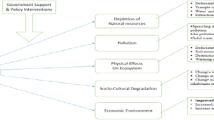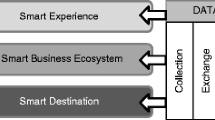Abstract
Urban tourism is an important research topic whether in mass tourism resort areas where tourism is the economic staple or in metropolitan areas where it is one (or more) development path(s) among many. Urban areas are dynamic and fast-paced environments but are also places where social and economic inequalities are most stark. Economic geography is one theoretical perspective through which researchers address urban tourism. The recent “evolutionary turn” in economic geography is finding its way to tourism studies but has only been applied to a few urban tourism cases. This paper sets out the potential of evolutionary economic geography (EEG) as a conceptual framework for urban tourism studies. The analysis draws on recent studies of urban tourism from an evolutionary perspective to highlight the strengths of taking such an approach and a number of avenues yet to be explored are put forward. Urban tourism affects large numbers of residents and businesses as well as influencing labour flows, and so understanding the dynamic nature of its development paths is vital. Tourism development does not occur in a vacuum, and urban tourism is one area where the complexity of the tourism economy and its place within broader regional development strategies is most obvious. Under recent neoliberal policies of urban development, tourism has become closely associated with place-based competition and large capital investments. Urban tourism also enters the fray in matters of contested urban spaces with issues of local governance, such as privatisation of public space, moving increasingly to the fore. The paper concludes with a list of future approaches to evolutionary studies of urban tourism to broaden the scope beyond the dominant financial metrics of tourism success.
Similar content being viewed by others
References
Ashworth, G., & Page, S. J. (2011). Urban tourism research: recent progress and current paradoxes. Tourism Management, 32(1), 1–15.
Beauregard, R. (1998). Tourism and economic development policy in US urban areas. In D. Ioannides & K. G. Debbage (Eds.), The economic geography of the tourist industry: a supply-side analysis (pp. 220–234). London: Routledge.
Bianchi, R. (2009). The ‘critical’ turn in tourism studies: a radical critique. Tourism Geographies, 11(4), 484–504.
Boschma, R., & Frenken, K. (2011). The emerging empirics of evolutionary economic geography. Journal of Economic Geography, 11(2), 295–307.
Boschma, R., & Martin, R. (2010a). The handbook of evolutionary economic geography. Cheltenham: Edward Elgar.
Boschma, R., & Martin, R. (2010b). The aims and scope of evolutionary economic geography. In R. Boschma & R. Martin (Eds.), The handbook of evolutionary economic geography (pp. 3–39). Cheltenham: Edward Elgar.
Brenner, N., & Theodore, N. (2002). Preface: from the “new localism” to the spaces of neoliberalism’. Antipode, 34(3), 341–347.
Brenner, N., Peck, J., & Theodore, N. (2010). After neoliberalization? Globalizations, 7(3), 327–345.
Brouder, P. (2013). Tourism development in peripheral areas: processes of local innovation and change in Northern Sweden. Östersund: Mid Sweden University.
Brouder, P. (2014a). Evolutionary economic geography: a new path for tourism studies? Tourism Geographies, 16(1), 2–7.
Brouder, P. (2014b). Evolutionary economic geography and tourism studies: extant studies and future research directions. Tourism Geographies, 16 (4).
Brouder, P., & Eriksson, R. H. (2013a). Staying power: what influences micro-firm survival in tourism? Tourism Geographies, 15(1), 124–143.
Brouder, P., & Eriksson, R. H. (2013b). Tourism evolution: on the synergies of tourism studies and evolutionary economic geography. Annals of Tourism Research, 43, 370–389.
Cooke, P. (1992). Regional innovation systems: competitive regulation in the New Europe. Geoforum, 23, 365–382.
Department of Transport, Tourism and Sport (2014). Record year for tourists from North America & best year for overall tourism since 2008. www.dttas.ie/tourism.
Essletzbichler, J. (2009). Evolutionary economic geography, institutions, and political economy. Economic Geography, 85(2), 159–165.
Essletzbichler, J. (2012). Generalized Darwinism, group selection and evolutionary economic geography. Zeitschrift für Wirtschaftsgeographie, 3, 122–146.
Fainstein, S. S., Hoffman, L. M., & Judd, D. R. (2004). Introduction. In L. M. Hoffman, S. S. Fainstein, & D. R. Judd (Eds.), Cities and visitors: regulating people, markets, and city space (pp. 1–19). Oxford: Blackwell.
Freeman, C. (1987). Technology policy and economic performance: lessons from Japan. London: Pinter.
Garcia-Cabrera, A. M., & Duran-Herrera, J. J. (2014). Does the tourism industry co-evolve? Annals of Tourism Research, 47, 81–83.
Gill, A. M., & Williams, P. W. (2011). Rethinking resort growth: Understanding evolving governance strategies in Whistler, B.C. Journal of Sustainable Tourism, 19(4–5), 629–648.
Gill, A.M., & Williams, P.W. (2014). Mindful deviation in creating a governance path towards sustainability in resort destinations. Tourism Geographies, 16 (4).
Gotham, K. F. (2006). Theorizing urban spectacle. City, 9(2), 225–246.
Hackworth, J. (2007). The neoliberal city: governance, ideology, and development in American urbanism. Ithaca: Cornell University Press.
Halkier, H., & Therkelsen, A. (2013). Exploring tourism destination path plasticity: the case of coastal tourism in North Jutland, Denmark. Zeitschrift für Wirtschaftsgeographie, 57(1–2), 39–51.
Hall, C. M. (2006). Urban entrepreneurship, corporate interests and sports mega-events: the thin policies of competitiveness within the hard outcomes of neoliberalism. Sociological Review, 52(S2), 59–70.
Hall, C. M., & Page, S. J. (2012). From the geography of tourism to geographies of tourism. In J. Wilson (Ed.), The routledge handbook of tourism geographies (pp. 9–25). London: Routledge.
Haugland, S., Ness, H., Grønseth, B.-O., & Aarstad, J. (2011). Development of tourism destinations: an integrated multilevel perspective. Annals of Tourism Research, 38(1), 268–290.
Henderson, J. C. (2006). Tourism in Dubai: overcoming barriers to destination development. International Journal of Tourism Research, 8, 87–99.
Hoffman, L. M., Fainstein, S. S., & Judd, D. R. (Eds.). (2004). Cities and visitors: regulating people, markets, and city space. Oxford: Blackwell.
Ioannides, D. (2006). The economic geography of the tourist industry: ten years of progress in research and an agenda for the future. Tourism Geographies, 8(1), 76–86.
Ioannides, D., & Debbage, K. G. (1998). The economic geography of the tourist industry: a supply-side analysis. London: Routledge.
Ioannides, D., & Debbage, K. G. (2014). Economic geographies of tourism revisited: from theory to practice. In A. A. Lew, C. M. Hall, & A. M. Williams (Eds.), The Wiley Blackwell companion to tourism (pp. 107–119). Oxford: Wiley Blackwell.
Judd, D. R. (2004). Visitors and the spatial ecology of the city. In L. Hoffman, S. Fainstein, & D. Judd (Eds.), Cities and visitors: regulating people, markets, and city space (pp. 23–38). Oxford: Blackwell.
Judd, D. R., & Fainstein, S. S. (1999). The tourism city. New Haven: Yale University Press.
Larsson, A., & Lindström, K. (2014). Bridging the knowledge-gap between the old and the new: regional marine experience production in Orust, Västra Götaland, Sweden. European Planning Studies, 22(8), 1551–1568.
Lundvall, B. Å. (Ed.). (1992). National systems of innovation: towards a theory of innovation and interactive learning. London: Pinter.
Ma, M., & Hassink, R. (2014). Path dependence and tourism area development: The case of Guilin, China. Tourism Geographies, 16 (4).
MacKinnon, D., Cumbers, A., Pike, A., Birch, K., & McMaster, R. (2009). Evolution in economic geography: institutions, political economy, and adaptation. Economic Geography, 85(2), 129–150.
Malerba, F. (Ed.). (2004). Sectoral systems of innovation. Cambridge: Cambridge University Press.
McWilliams, D. (2014). Tech industry looks good on paper—but agriculture is the lifeblood of our economy. Irish Independent (Sep 25th 2014), www.davidmcwilliams.ie/2014/09/25.
Milne, S., & Ateljevic, I. (2001). Tourism, economic development and the global–local nexus: theory embracing complexity. Tourism Geographies, 3(4), 369–393.
Neffke, F., & Svensson Henning, M. (2010). Seeds of structural change. The role of entrepreneurs and expanding firms in shaping local path dependencies. Rotterdam: Erasmus Research Institute of Management.
Owens, L. (2008). From tourists to anti-tourists to tourist attractions: the transformation of the Amsterdam squatters’ movement. Social Movement Studies, 7(1), 43–59.
Page, S. J. (1995). Urban tourism. London: Routledge.
Papatheodorou, A. (2004). Exploring the evolution of tourism resorts. Annals of Tourism Research, 31(1), 219–237.
Peck, J., & Tickell, A. (2002). Neoliberalizing space. Antipode, 34(3), 380–404.
Randelli, F., Romei, P., & Tortora, M. (2014). An evolutionary approach to the study of rural tourism. Land Use Policy, 38, 276–281.
Richards, G., & Russo, P. (2014). Alternative and creative tourism. Arnhem: ATLAS.
Richards, G., & Wilson, J. (Eds.). (2007). Tourism, creativity and development. London: Routledge.
Rogerson, C. M. (2013). Urban tourism, economic regeneration and inclusion: evidence from South Africa. Local Economy, 28(2), 188–202.
Rogerson, C. M., & Rogerson, J. M. (2014). Urban tourism destinations in South Africa: divergent trajectories 2001–2012. Urbani Izziv, 25(Supplement), S189–S203.
Rogerson, C. M., & Visser, G. (2007). Tourism research and urban Africa: the South African experience. In C. M. Rogerson & G. Visser (Eds.), Urban tourism in the developing world: the South African experience (pp. 13–40). New Brunswick: Transaction.
Rogerson, C. M., & Visser, G. (2011). Rethinking South African urban tourism research. Tourism Review International, 15(1/2), 77–90.
Sanz-Ibáñez, C., & Anton Clavé, S. (2014). The evolution of destinations: towards an evolutionary and relational economic geography approach. Tourism Geographies, 16 (4).
Smith, N. (2009). The revolutionary imperative. Antipode, 4, 50–65.
Tufts, S. (2006). We make it work: the cultural transformation of hotel workers in the city. Antipode, 38(2), 350–373.
Wilson, D. (2004). Toward a contingent urban neoliberalism. Urban Geography, 25(8), 771–783.
Zampoukos, K., & Ioannides, D. (2011). The tourism labour conundrum: agenda for new research in the geography of hospitality workers. Hospitality and Society, 1(1), 25–45.
Author information
Authors and Affiliations
Corresponding author
Rights and permissions
About this article
Cite this article
Brouder, P., Ioannides, D. Urban Tourism and Evolutionary Economic Geography: Complexity and Co-evolution in Contested Spaces. Urban Forum 25, 419–430 (2014). https://doi.org/10.1007/s12132-014-9239-z
Published:
Issue Date:
DOI: https://doi.org/10.1007/s12132-014-9239-z




